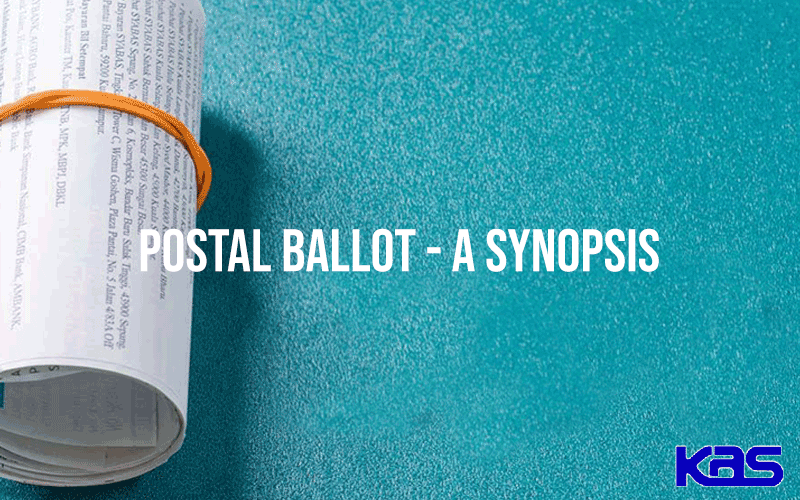-
Concept:
The Companies Act, 2013 comprehensively defines and regulates the manner in which the provisions relating to Postal Ballot are to be exercised. “Postal Ballot” means the casting of vote by a shareholder by postal or electronic mode. It is a system of voting which facilitates the shareholders to cast their votes without making their presence in the general meeting. Section 110 of the Companies Act, 2013 read with Rule 22 of the Companies (Management and Administration) Rules, 2014 stipulates the business matters which are mandatorily required to be transacted through Postal Ballot. They are:
- Alteration in the Objects Clause of the Memorandum of Association;
- Conversion of Private Company into a Public Company and vice versa;
- Change in location of Registered Office outside local limits of any city, town or village;
- Change in Objects for which a Company has raised money from public through a prospectus and still has any unutilized amount out of the money so raised;
- Issue of shares with differential voting rights;
- Variation of rights of shareholders, debenture holders or other security holders;
- Buy- back of shares of the Company;
- Election of a Director;
- Sale of whole or substantially the whole of undertaking of a Company;
- Giving loans or extending guarantee or providing security in excess of the stipulated limits;
- Any other matter as may be decided by the Board to be passed through the Postal Ballot.
-
Class Of Companies For Whom Postal Ballot Is Mandatory:
All Companies (except a One Person Company and other Companies having upto 200 members) are required to transact the aforesaid matters only by means of Postal Ballot. But aforesaid matters may be transacted in the General Meeting instead of passing by Postal Ballot by those Companies which provide e-voting facility to its members.
-
Matters That Cannot Be Transacted Through Postal Ballot:
The following matters can only be transacted at a duly convened General Meeting and thus, cannot be passed through Postal Ballot:
- All business matters which are deemed as Ordinary Business at an Annual General Meeting viz.
-
- Consideration of financial statements and board’s and auditors’ Reports;
- Declaration of any dividend;
- Appointment of directors in place of those retiring and;
- the appointment of and the fixing of the remuneration of the auditors;
- Any business matter in respect of which directors or auditor has a right to be heard at any meeting.
-
Procedure For Transacting Matters Through Postal Ballot:
-
-
Board approvals:
The Board shall pass a resolution for the approval of draft notice of Postal Ballot, other related documents, the appointment of scrutinizer and the appointment of agency to provide e-voting platform in case e-voting facility is being provided.
-
Notice:
- The Company shall send a notice of the Postal Ballot to all shareholders alongwith a draft resolution that describes the reason for the event and requesting them to convey their assent or dissent in writing within 30 days from the date of dispatch of notice.
- Notice can be sent either by Registered Post or Speed Post or any electronic means or Courier Service.
- The notice of Postal Ballot must be published on the website of the Company, if any, forthwith after the notice is sent to the members and such notice shall remain on such website till the last date for receipt of the Postal Ballots from the members.
-
Newspaper advertisement:
An advertisement pertaining to dispatch of the ballot papers is required to be published in a vernacular language newspaper and in an English language newspaper. The advertisement must specify the following:
-
-
-
- A statement to the effect that the business is to be transacted by Postal Ballot which includes voting by electronic means;
- Date of completion of dispatch of notices;
- Date of commencement of voting;
- Date of end of voting;
- Statement that any Postal Ballot received from the member beyond the said date will be invalid and voting will not be allowed beyond the date;
- A statement to the effect that members, who have not received Postal Ballot forms may apply to the company and obtain a duplicate thereof and;
- Contact details of the person responsible to address the grievances connected with the voting by Postal ballot including voting by electronic means.
-
-
-
Manner of passing of a resolution thru Postal Ballot:
A resolution shall be deemed to have been duly passed by Postal Ballot if it is assented to by the requisite majority of the shareholders stipulated under the Companies Act, 2013.
-
E-voting Facility to Shareholders:
A Company which is mandatorily required to provide e-voting facility to its shareholders for passing a resolution in the General Meeting shall have to extend the e-voting facility for passing the resolutions through Postal Ballot also.
-
Conclusion:
Over the years, the concept of Postal Ballot coupled with E-voting has greatly increased the shareholder participation in the running of any Company. This will go a long way in improving the Corporate Governance standards of the Companies and the manner in which the shareholders, as a stakeholder is treated by the Managements of the Companies.







Leave A Comment